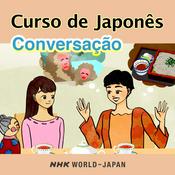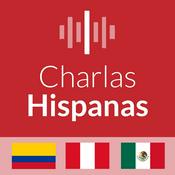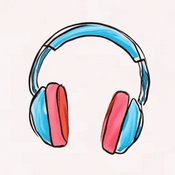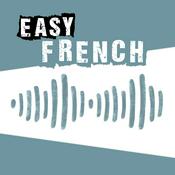485 episódios
- Read along to practice your English and to learn the English phrases SCARRED FOR LIFE and THAT'S GOING TO LEAVE A MARK / SCAR!
In this English lesson, I wanted to help you learn the English phrase scarred for life. Now, this is a more serious phrase, and we use it to talk about when something traumatic happens to someone and it's something that they will remember for the rest of their life. I guess the best example would be this. When I was a kid, we were sitting, waiting for a lift, bridge to come down, and a, person hit us from behind. And in some ways, in a very small way, I was scarred for life. I'm always afraid when I'm stopped somewhere now that someone's going to hit our car from behind. Luckily, when I was a kid, when that happened, no one was hurt. We had a really big car. The people who hit us, though, were injured quite badly. And I do remember I was probably 9 or 10 years old seeing the ambulance come to take those people out. So in a small way, I mean, other people have far more serious things happen to them. But in a small way, I was scarred for life.
I don't teach serious phrases very often. But I think it's important.
WANT FREE ENGLISH LESSONS? GO TO YOUTUBE AND SEARCH, "BOB THE CANADIAN"
If you enjoy these lessons please consider supporting me at: http://www.patreon.com/bobthecanadian
The second phrase I wanted to teach you is that's going to leave a scar or that's going to leave a mark. This phrase is sometimes used in a humorous way. Here's an example. Let's say you're watching a soccer game or a football game. Someone kicks the ball and it hits another player in the face. You might react by going, ooh, that's going to leave a scar, or, oh, that's going to leave a mark. Basically what you're saying is, there's probably going to be a bruise or something after that happens. You can also use this figuratively when something happens to someone that isn't an actual action. Maybe at work you get fired and you can say, you know, that's going to leave a mark. That's going to, going to leave a mark for that guy or for you. Because, yeah, losing your job is not fun.
To review when you are scarred for life. It means something traumatic happened when you were younger and you still at times think about that in a negative way. You have negative emotions, and then that's going to leave a scar or that's going to leave a mark simply means that something physical has happened or something, you know, an action has just occurred that will, you'll remember it for a long time.
Let's, let's look at a comment from a previous video. I'm not in the right mood to teach serious phrases. It's a tough thing to do, you know, I want to do an English lesson about death at some point, but I don't know how to do it well. So I just never do it. But maybe someday. This is from Zerevan. That old car needs a lot of gas. It's tough to have an old car. And my response, for sure, I'm surprised how much better on gas our new car is, although I am comparing it to my minivans, which are older and bigger, so maybe not a fair comparison. Thanks, Zerevan, for that comment.
But, yeah, yeah, there was a car, in a video the other day a couple days ago. Whoa. That was a fast turn, Bob. And it was huge. It was enormous. What surprised me is many of you commented about the car, which was cool, but no one commented about the huge family of kids that walked by. At the beginning, I didn't realize they were behind me. I was in the zone when I was making that English lesson. And then when I sat down to edit it, I was like, how many kids are in that family? There was, like, one kid, two, three kids, four kids, five kids. It was a big family. So I'm glad my camera blurs people in the background out a bit, because I don't want to inadvertently put people in
Support the show - Read along to practice your English and to learn the English phrases TO PUT A DAMPER ON SOMETHING and A WET BLANKET
In this English lesson, I wanted to teach you the English phrase to put a damper on something. When you put a damper on something, it means that you make it not fun. Or something can also put a damper on something else. Right now, the weather is putting a damper on Jen's ability to plant things. It's been raining for two days, and that has, certainly put a damper on progress on the farm. This can happen at work, too. Maybe your boss, decides that everybody has to work on Saturday, and that really puts a damper on your weekend plans.
WANT FREE ENGLISH LESSONS? GO TO YOUTUBE AND SEARCH, "BOB THE CANADIAN"
If you enjoy these lessons please consider supporting me at: http://www.patreon.com/bobthecanadian
The other phrase I wanted to teach you today is a wet blanket. A wet blanket is a term we use to describe someone who makes something no fun. If your boss makes you work Saturday and that puts a damper on your weekend, we might say your boss is a wet blanket. A person who makes something, not fun. So they are someone who steals the joy from something. You might know someone who, if you invite them to a party, they're a wet blanket. And they don't add any fun or joy to the party. They just complain all the time.
So, to review, to put a damper on something means to make something not fun, in the way that, you know, something or someone makes it not fun. And then a wet blanket would be a term used to describe someone who puts a damper on things. They're kind of related, aren't they?
But, hey, let's look at a comment from a previous video. This comment is from Sibelk. Thanks a lot. And your farm looks so peaceful. And my response, it is nice, but a bit rainy and cold the last few days. That's really putting a damper on things. Thanks, Sibelk, for that comment. And that was me using, the phrase in the comment. So I hope you enjoyed that. You do know that's where my phrases come from, right? I interact with people in the world and then I use what they say, to create English lessons for you.
So what was I going to show you today? Well, we're walking out here in the rain. There are puddles along the driveway. I put these little French drains in. I think I showed you this last year. And they're kind of working to keep the puddles away. But I feel like I need to add, another one here. I took the shovel out this morning and I dug one temporarily. But you can see as it rains, the water is all flowing this way and creating these puddles, which, I don't enjoy having. I like it when, the driveway stays dry. I don't mind rain. I don't mind water. But I do really like it when the driveway stays dry.
And then. Yes, this is putting a damper on things. Jen would love to be planting flowers and even harvesting some flowers. But in order for flowers to grow and bloom, you need sunlight and you also need warmth. Like, it has to be a somewhat warm day. Here you can see some water again, just trickling. I was going to show you that I wore mismatched shoes this morning. I just put my running shoes on because, I don't know why I should have put normal shoes on. I'm kind of on my way to work, so I do have to go back in the house and change my shoes, before I head out.
So, Jen just said we're in a rainfall warning. We already got an inch of rain today and, since yesterday. And, yeah, hopefully it stops soon. I don't have crops out in my big field yet. My neighbor did come and work up the field, but, we're going to have to wait on that as well, for a week or more until everything dries up. So there you go. The trees love it. The grass loves it. Way out there, you can see Walter. Walter, come on. Pup. Walter Walter. He's not rea
Support the show - Read along to practice your English and to learn the English phrases TO PUT TOGETHER and TO PULL YOURSELF TOGETHER
In this English lesson, I wanted to help you learn the English phrase to put together. When you put something together, it means there are pieces. And then you attach all the pieces together with glue or screws or nails or something like that.
If you're wondering what the noise is, Jen's driving by in her gator, which kind of cracks me up because one of the last comments was that there was too much noise when I make these videos in town and some, someone wanted me to do them on the peaceful farm. And I thought I should do that. But, then there was still some traffic, wasn't there?
WANT FREE ENGLISH LESSONS? GO TO YOUTUBE AND SEARCH, "BOB THE CANADIAN"
If you enjoy these lessons please consider supporting me at: http://www.patreon.com/bobthecanadian
Anyways, when you go to Ikea and you buy a bed, it comes in a box and then you need to put it together. When you get home, you need to use the tools and the screws that they give you. Or maybe you need to get your own screwdriver and you take all the pieces. And when you're done, after you put the bed together, you have a, bed. So when you put something together, it's in pieces and then when it's done, it's whole.
The other phrase I wanted to teach you today is to pull yourself together. I might have taught this one before. All of a sudden I just thought, maybe I have, but I'll teach it again. Anyways, if you are emotional, if you are sad or upset or crying, you might need to pull yourself together. Let's say you're at a wedding and it's beautiful and maybe someone you know is getting married and you're, you're just crying a little bit, but they're tears of joy. And then you have to go up and give a speech. You need to pull yourself together before you go up and give the speech. You need to get control of your emotions. You need to calm down.
So to review, to put together, to put something together means, oh, here's another good example. If you ever played with Lego, you get a Lego set. And then you need to put together all the pieces to build what you are building. And to pull yourself together simply means to calm yourself down when you're in an emotional state. When you're in a heightened emotional state. But hey, let's look at a comment from a previous video. This comment is from ksenom. I never get up on the wrong side of the bed. There's a concrete wall. What's the difference between make the bed and assemble the bed? Dandelions grow here in Finland too. However, this spring, the night temperatures have been unusually low, so the flowers haven't appeared. Yet. And my response, when you buy a bed from a store, you assemble it. You do this once, you put it together. When you make the bed, you tidy up the blankets.
So thanks ksenom. for that comment. And hopefully you understood the difference. When you use the verb to make the bed, it's to put all the blankets flat. But if you were to get wood and cut the wood and like, not assemble it, like you are literally going to build it, we could use the verb make as well. But generally, 99% of the time when you make the bed, it means you're putting the blankets on nicely.
Today I wanted to talk about shade. The shade has returned on my farm, on my property. One of the problems with making videos in town is that you don't get to see all of the changes here on the farm property. So you can see that hopefully I'm not rotating you too quickly. You can see that shade has returned. I'm standing in the shade of this tree and it is beautiful. And hopefully, cross my fingers, the weather is beautiful on the first Saturday of June. And I can sit here. You'll recognize the view in a moment. I can sit here and do my l
Support the show - Read along to practice your English and to learn the English phrases TO GET UP ON THE WRONG SIDE OF THE BED and TO MAKE THE BED
In this English lesson, I wanted to help you learn the English phrase to get up on the wrong side of the bed or to wake up on the wrong side of the bed or to get out of the wrong side of the bed. There's a lot of different variations to this phrase, but basically it means that you're in a bad mood. If I was crabby and cranky, Jen might say, hey, did you get up on the wrong side of the bed? I wanted to make sure I said this version of the phrase, did you get up on the wrong side of the bed this morning? And that would simply mean, wow, did you not sleep good, did you have a bad sleep, and now you're in a bad mood.
WANT FREE ENGLISH LESSONS? GO TO YOUTUBE AND SEARCH, "BOB THE CANADIAN"
If you enjoy these lessons please consider supporting me at: http://www.patreon.com/bobthecanadian
The other phrase I wanted to teach you today is simply to make the bed. This is what you do after you get up. You put the pillows nice at the top of your bed and you put the blankets nice and flat. We have what's called a sheet, and then we have a comforter. And we just kind of make the bed every morning after we get up. So we put all the blankets nice and flat and tidy.
So to review, to get up on the wrong side of the bed or to wake up on the wrong side of the bed, or to get up out of the wrong side of the bed, however you say it, it means you're in a bad mood. And to make the bed simply means. Yeah, to put all of the blankets and sheets flat so they look nice.
So let's look at a comment from a previous video. If you're wondering why I'm out of sorts, it's so bright out here, I have to find my sunglasses. You know, you'll notice I can hardly keep my one eye open. I'm not sure if the camera communicates that.
But hey, let's look at a comment from a previous video. This comment is from Ismail. Hi, Bob. That sign that says more points, more ways on the gas pump, I think it's about a rewards program like getting points when you buy gas. But I wasn't sure how it works exactly in that place. Just curious, what's it all about? And my response, yes, you get points when you buy gas. This is from the video from a couple days ago at the gas station. You can then use the points to get 4 cents a liter off your purchase. I think you need about 4,000 points to do that.
So thanks, Ismail, for that question. Yeah, at our gas station and at a lot of places, you get points if you buy certain things and then you can use Those points like money. I don't know how many points you get for a tank of gas, but I do know that every once in a while I have enough points that I can get 4 cents a liter off.
So what am I doing here? I wanted to show you dandelions. So we are in prime dandelion season. Dandelions are, of course, these little yellow flowers that show up in lawns probably in a lot of different places in the world. I'm kind of curious whether you have dandelions where you live or not. For the next week or so, there will be a lot of dandelions around. Like, this is a local soccer field. They do a lot of work here to make sure the grass is nice and green. But the dandelions, they still come. They are pretty good at growing almost everywhere in Ontario, Canada.
I don't want to go over there, but in the distance, there's actually some sort of school event. It's not my school. I wonder if it's a track and field meet. A track and field meet is where you run the 100 meter, the 800 meter. You do long jump and triple jump and all those other kinds of events. Because there's children involved. I don't want to walk over there. They want their privacy and just not a good idea. If I'm in a public place, like when I'm at the publ
Support the show - Read along to practice your English and to learn the English phrases TO SUGARCOAT and A COAT OF PAINT
Hi. I'll teach the phrase in a moment. I just got to get my gas pumping here. And then I will get started on the phrase to sugarcoat. Let me see here. Almost ready. There we go.
WANT FREE ENGLISH LESSONS? GO TO YOUTUBE AND SEARCH, "BOB THE CANADIAN"
If you enjoy these lessons please consider supporting me at: http://www.patreon.com/bobthecanadian
Well, hi. In this English lesson, I wanted to help you learn the English phrase to sugarcoat. When you sugarcoat something, it means you're giving someone serious news, but you're making it sound not serious. A great example would be if you go to the hospital, maybe you were in an accident and they do some X rays and the doctor comes out and says, well, I'm just gonna say it won't be very long before you're feeling a lot better. You might say to the doctor, please don't sugarcoat it. Just tell me exactly what's wrong. And then the doctor might say, well, you broke your leg and your arm and you're going to have a long recovery. Something super serious like that. So to sugarcoat means to make something serious sound not serious.
The other phrase I wanted to teach you today is a coat of paint. If you look here, this looks like it has a fresh coat of paint on it. My van could use a fresh coat of paint. When we talk about a coat of paint, it's as if when you put the paint on, it forms a coat. Sorry, there's a big, huge truck going by if you're wondering what the loud noise is. But anyways, a coat of paint is just the paint that you put on in one layer. Sometimes you put on two coats of paint, sometimes three.
So to review, to sugarcoat something means to make it sound better than it is. And a coat of paint simply refers to a layer of paint that is on something like a van or this post here.
But hey, let's look at a comment from a previous video. Let me check my gas for a sec. $70 already. Wow, it's expensive. This comment is from Meng. Daffodils in England were in full bloom a month or two ago, and now they are past their prime. Oh, I'm done pumping. I should hurry up. And then I responded by saying, I guess you're ahead of us then. Also, great use of the face... of the phrase past their prime. Yeah, it's a good phrase. When something's past its prime, it means it isn't. Isn't doing well anymore. It's getting old and not in its. Well, in its prime. I was gonna say in its heyday, which is another way of saying it.
So how much is gas here? Let me have gas is $1.35.9 cents. Gas in Canada has gotten a little bit cheaper. But honestly, I have a bit of a dilemma because if I go to the city, gas is right now 10 cents a liter cheaper in the city for some reason. I don't know why, but it's 10 cents a liter cheaper. So the problem I have is do I drive to the city and use extra gas to fill up my van so that it's cheaper? Or do. Or do I just buy the more expensive gas?
So hey, some of you might be wondering, I think in a previous video, I don't know on which channel, I talked about how this van had to go to the garage for some work. It smelled like gas. It ended up being something fairly simple. It was less than $200 to get it fixed. So I'm happy that my little blue van is still on the road and still doing well. Hopefully it lasts a long time because we need it to. So yeah, I tanked it up with gas and it's good for a little while yet. By the way, only I drive this van. My kids have decided they like the newer car better and the red van is, I think, more reliable. So it's just me now. Me and my blue van, which some people think is gray, but I think it's blue. Maybe let me know in the comments below what color you think this van is.
Anyways, thanks for watching. I'll see you in a
Support the show
Mais podcasts de Ensino
Podcasts em tendência em Ensino
Sobre Bob's Short English Lessons
If you want to learn English with short easy-to-understand lessons then you've come to the right place. I'm Bob the Canadian and I make videos on Youtube (Just search for "Bob's Short English Lessons" on Youtube!) as well as podcasts right here to help you learn English. Four times each week I upload a short English lesson with a complete transcript in the description. During these lessons I teach one or two curious phrases from the English language and answer a listener question. Thanks for joining me and I hope your English learning is going well!
Site de podcastOuça Bob's Short English Lessons, Flow Podcast e muitos outros podcasts de todo o mundo com o aplicativo o radio.net

Obtenha o aplicativo gratuito radio.net
- Guardar rádios e podcasts favoritos
- Transmissão via Wi-Fi ou Bluetooth
- Carplay & Android Audo compatìvel
- E ainda mais funções
Obtenha o aplicativo gratuito radio.net
- Guardar rádios e podcasts favoritos
- Transmissão via Wi-Fi ou Bluetooth
- Carplay & Android Audo compatìvel
- E ainda mais funções


Bob's Short English Lessons
Leia o código,
baixe o aplicativo,
ouça.
baixe o aplicativo,
ouça.







































